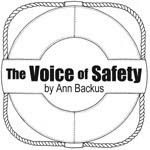“Water, Water, Everywhere, Nor Any Drop to Drink”
by Ann Backus, MS

In the Rime of the Ancient Mariner by Samuel Taylor Coleridge (1834) we find these words:
Water, water, everywhere,
And all the boards did shrink.
Water, water, everywhere,
Nor any drop to drink.
Summer on the ocean, on the coast, is a pleasure in many ways. Whether fishing commercially or enjoying recreational boating, we are out on the water – salt water.
Water is everywhere.
The “boards” Coleridge mentions apparently refer to deck boards not the wooden hull. Wooden deck boards will shrink under hot sun in a non-humid environment in spite of being on a sea-going vessel. The other truth referenced in this stanza is that we humans cannot drink the salty ocean water and survive, in spite of water being everywhere.
Physiologically, the salt balance in our bodies is internally regulated. We excrete salt through our sweat and tears, but our bodies cannot remove salt efficiently enough for us to be able to drink salt water.
On the other hand, seagulls have salt glands over their eyes that extract the salt from their blood, and they excrete salt through openings that are visible on the sides of their beaks. Salt water reptiles such as crocodiles and sea turtles also have salt glands. Some plants excrete salt, for example, the button mangrove.
Humans need water to survive
Thirst is a part of
the feedback loop
that is programmed
into us to help us
remain hydrated.
We humans need water to survive. Water is in every type of cell in our bodies – even in bone. The total body water of adults ranges from 50-60% with men having more water than women and the elderly having less water than the middle aged. Our bodies require water along with oxygen in order to metabolize the food we eat. For all these reasons we need to remain hydrated ? need to drink substantial amounts of water daily.
When out in the sun or out on the ocean we lose more water from evaporation than when we are in the shade or out of the wind. Hence remaining hydrated while fishing or boating is important. If the boating involves exercise such as rowing, canoeing, kayaking, hauling traps or active long-line fishing, we require even more water because we are expending energy during these activities.
Thirst is a part of the feedback loop that is programmed into us to help us remain hydrated. We experience thirst when we have a water deficit of only 1%. That number is in itself an indicator of how important water is. That is, it only takes a shortage of 1% before our bodies tell us to replenish the lost water. And one note to older readers, as we age this thirst feedback loop fades out, and we don’t experience being thirsty as readily as we did when we were younger. Therefore, it is very important that older folks drink water even if, or when, they are not thirsty.
Drinking more water
could reduce the
number
of musculo-skeletal
injuries and improve
cognition in fishermen.
A New Zealand researcher, Marion Edwin of Optimize Ltd., undertook a hydration study with sea-going fishermen. The findings of her study include that only 8.2% of the 49 fishers tested were euhydrated” i.e., well-hydrated. A large percentage, 83.6% of the 49 fishers, were dehydrated. For the full article “Dehydration in New Zealand fishing vessel crews” please see https://docs.wixstatic.com/ugd/808bad_6170d98b0ad044588b61a7ce6dca642f.pdf.
The impact of dehydration is a slowing of both musculo-skeletal response and cognition – the ability to notice situations and make appropriate behavioral responses and choices. As Edwin points out in her article, fatigue increases and work capacity decreases with dehydration, plus there can be long term health implications such as kidney stones and bladder cancer.
Coffee, tea,
alcoholic beverages
and soft drinks
don’t count for water.
Her recommendations include that drinking more water could reduce the number of musculo-skeletal injuries and improve cognition in fishermen.
The reasons for dehydration in fishermen are not hard to understand: fishing is a very active occupation; there are often long periods of activity without a break and therefore without a chance for water. In addition, fishermen may choose coffee or tea, alcoholic beverages or soda for their “break” drink over plain water. Coffee and tea are dehydrating drinks, also called diuretics, so even though largely water, they cause us to release water rather than retain it. Alcoholic beverages don’t count for water, and soft drinks, although they may count for some water, often bring along calories if they are not diet drinks.
The bottom line is that fishermen and those of us on the water whether commercially or recreationally, need to be mindful of our need for water. Because we cannot just grab a cupped-handful of water from the ocean the way we might from a cool trout stream, we need to plan-ahead, bring sufficient water for ourselves and our crew, and take replenishment breaks. Remember water for the kids, too.
Eight ounces of water every couple of hours during our waking hours can get us close to the recommended 64 ounces of water per day for adults. Drinking enough water reduces fatigue and improves the functioning of body and mind.
On a personal note: members of our family drink a glass of water in the morning before the first cup of coffee or tea. Also, I put a cold pack with water bottles on the front porch every day in the summer for the mailcarrier. He or she often writes “thank you” on the envelopes before slipping them through the mail slot.
Enjoy the sun and ocean this summer. Hydrate for high-function and health. With apologies to Coleridge: Water, water, everywhere, but please take some to drink.
Ann Backus, MS is an Instructor in Occupational Health at Harvard School of Public Health, 665 Huntington Ave., Boston MA 02 5, 617-432-3327, abackus@hohp.harvard.edu.
